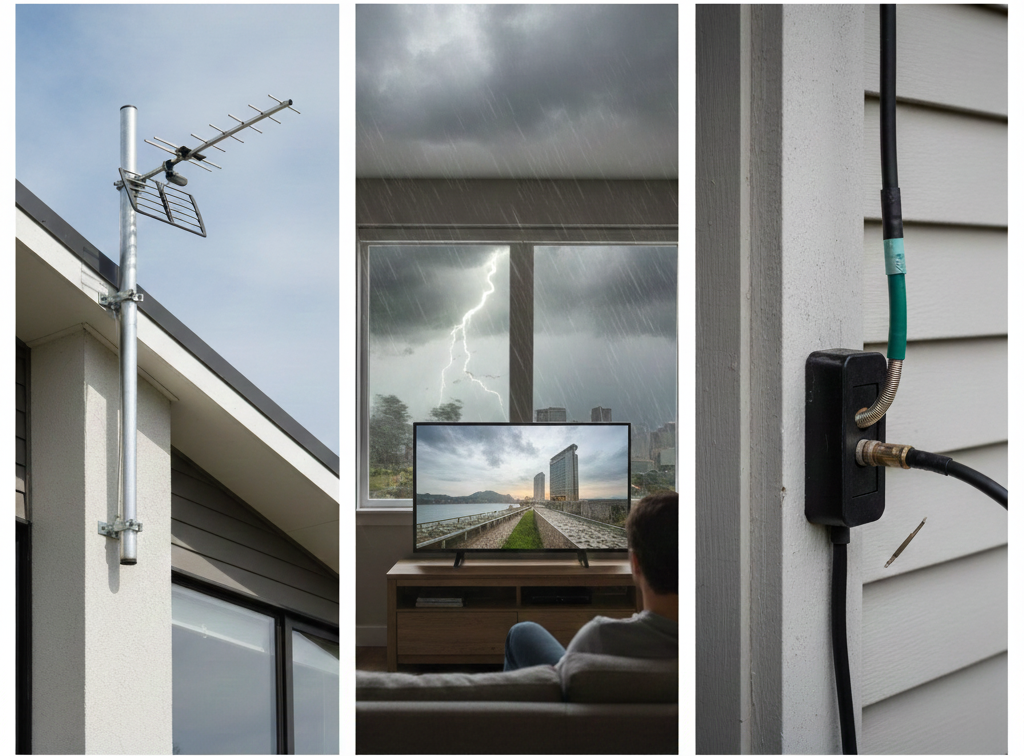Nothing is more frustrating than sitting down to watch TV and noticing pixelation, dropped channels, or a black screen. Weather conditions can affect even the best TV wall mounting and TV antenna, making clear reception a challenge. Understanding the causes and taking proactive measures can help maintain consistent TV performance.
How Storms and Rain Affect Your Signal
Heavy rain, snow, or even prolonged humidity can weaken your TV signal. Water in the air interferes with the transmission between broadcast towers and your antenna. Over time, moisture may seep into connectors or coaxial cables, reducing the overall signal strength.
To minimize these issues, check that your cables are weatherproof and sealed. Proper protection ensures your antenna continues to perform even during adverse weather.
Wind and Shifting Antennas
Strong winds can slightly move your antenna, changing its alignment with the broadcast tower. Even small shifts can reduce signal quality, causing pixelated images or missing channels.
Branches or nearby structures moving in the wind may also temporarily block signals. Secure TV wall mounting and robust antenna brackets help prevent wind-related signal problems.
Temperature and Seasonal Changes
Changes in temperature can subtly affect how signals travel through the air. On hot summer days or cold winter mornings, you might notice slight drops in reception quality. High humidity levels can also influence signal strength by altering air density.
Being aware of seasonal variations allows you to take preventive steps, such as adjusting antenna position or using signal-enhancing tools.
Using Antenna Boosters for Stable Reception
If you live in an area prone to weak signals, an antenna booster can improve reception reliability. Boosters amplify incoming signals, making them less vulnerable to interference from rain, wind, or temperature changes. Proper installation and setup are crucial for optimal performance.
DIY Maintenance Tips

Maintaining your TV setup is key to reducing weather-related problems:
- Inspect Your Antenna and Mounting – Make sure your antenna is tightly secured and mounted properly.
- Check Cable Connections – Ensure all cables are weatherproofed and free from corrosion.
- Reposition When Needed – If your TV signal drops, small adjustments can restore reception.
- Monitor Performance During Storms – Keep an eye on how different weather conditions affect your channels to plan preventive measures.
When Professional Help Is Needed
Sometimes, weather isn’t the only issue. Persistent signal problems may indicate:
- Damaged antenna components
- Loose or corroded cable connections
- Internal issues with the TV’s tuner or board
Professional TV repair experts can diagnose and fix these issues efficiently. At Brocky’s TV, we provide full services including wall mounting, antenna installation, signal boosting, and TV repair to keep your reception consistent.
Conclusion
Weather can have a big impact on your TV signal, but understanding the effects and taking action can significantly reduce disruptions. Proper TV wall mounting, secure cables, use of an antenna booster, and occasional professional assistance ensure you enjoy clear channels throughout the year. By following these steps, your TV remains reliable, whether it’s raining, windy, or sunny.

